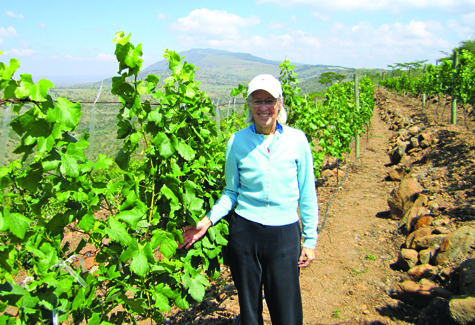Wine Column: A 2011 resolution – Never drink bad wine
 The arrival of another new year is invigorating. I love the opportunity to have a fresh start, despite the pain that comes with reassessing the past. Over the Christmas holiday, I had a rare opportunity to gain a new perspective on the world when I spent two weeks on the beach in Lamu, an ancient Swahili port on an island off the east coast of Kenya.
The arrival of another new year is invigorating. I love the opportunity to have a fresh start, despite the pain that comes with reassessing the past. Over the Christmas holiday, I had a rare opportunity to gain a new perspective on the world when I spent two weeks on the beach in Lamu, an ancient Swahili port on an island off the east coast of Kenya.
My hosts, Richard Leakey and his family, grow pinot noir and chardonnay near their main residence in the Ngong Hills outside Nairobi. In 2006 and 2007, I helped them prune their vines and make their wine; this time, my visit to their family retreat on the coast was purely for pleasure. Beyond the thrill of swimming, snorkeling and sailing in the warm waters of the Indian Ocean, I enjoyed a reality check from this vibrantly distinctive community.
My sensory memory bank was recharged with new impressions: the scent of spiced porridge cooking on the charcoal brazier of a passing dhow; the chants of boys in a Muslim procession through Lamu; the cool interior of a house built of coral. Early every morning, I heard the mullah’s call to prayer from the nearby town, mixed in with the sounds of birds, braying donkeys, crowing roosters and chugging motorboats bringing workers to town from the mainland. Some days, the Lamu symphony included hymns from an evangelical Christian group, singing in anticipation of Jesus’ imminent return, and drumming from a home for orphans. The Leakeys’ 6-year-old granddaughter, Seiyia, said of the mullah’s call to prayer, “He doesn’t sing very well, but you can tell he’s trying.”
That gave me a jolt. How many of us try hard at what we do? I think of myself as sincerely trying. But seeing the Leakeys’ efforts to improve their world make mine pale in comparison. At constant risk to their own lives, the Leakeys have led expeditions into the African wilderness, seeking the origins of man (currently at the Turkana Basin Institute). They have worked tirelessly to preserve Africa’s wildlife, to conserve her natural and cultural resources and to combat corruption. Richard Leakey has had more near-death experiences from injuries and ailments than an adventurous cat. In his family, if anyone gets sick or hurt, the response is, “Oh, bad luck. Carry on.”
Coupled with the Leakeys’ disregard for pain is their enthusiastic pursuit of gustatory pleasure. Going snorkeling? Richard will bake bread on the boat while you swim over brilliant coral reefs. Want ham for lunch? Richard raises his own pigs and cures his own ham. Fresh samosas, aromatic pilau, chicken in coconut milk, baby lettuce from the Nairobi garden, mango from the tree outside — all are accompanied by the Leakeys’ crisp Chablis-esque chardonnay or their silky-smooth, slightly smoky pinot noir. We might have a bright Sancerre or French chablis, just for contrast.
I’ve never raised pigs, and I’m not about to start, but I do like to cook, bake bread, eat fruits and vegetables from my garden and make my own wine. The results are not always perfect, but, as with the mullah’s call to prayer, the effort validates the result. I came away from my brief stay on the other side of the world with a heightened appreciation for sincere effort. Part of that appreciation embodies a new resolve to be more sanguine. No more tears when things go wrong. Buck up and do better. Admit mistakes, and move on.
The wine-related part of this resolution is simple: drink no bad wine. Why compromise your senses with anything you don’t like? There are times when politeness mandates accepting some wine you don’t like, but there’s usually a handy potted plant that won’t complain when you splash half a glass in it.
What qualifies wine as “bad”? Few of today’s wines suffer from the vinegar spoilage that used to be common 30 years ago, but there are other flaws that warrant rejection. Cork-finished wine may suffer from “cork taint,” which can simply repress the usual fruit aromas of the wine, or completely ruin the wine with a musty, mildewed aroma. Brettanomyces yeast is a common spoiler in red wines; it smells like dead mice or horse sweat, but at low levels can be attractively spicy. Oxidized wines smell like sherry. Unbalanced wines are too acidic, tannic, sweet or alcoholic. If you don’t like it, don’t drink it.
Fundamentally, if we can’t enjoy life, it’s our own damn fault.
Ms. Hargrave was a founder of the Long Island wine industry in 1973. She is currently a freelance writer and consultant.


